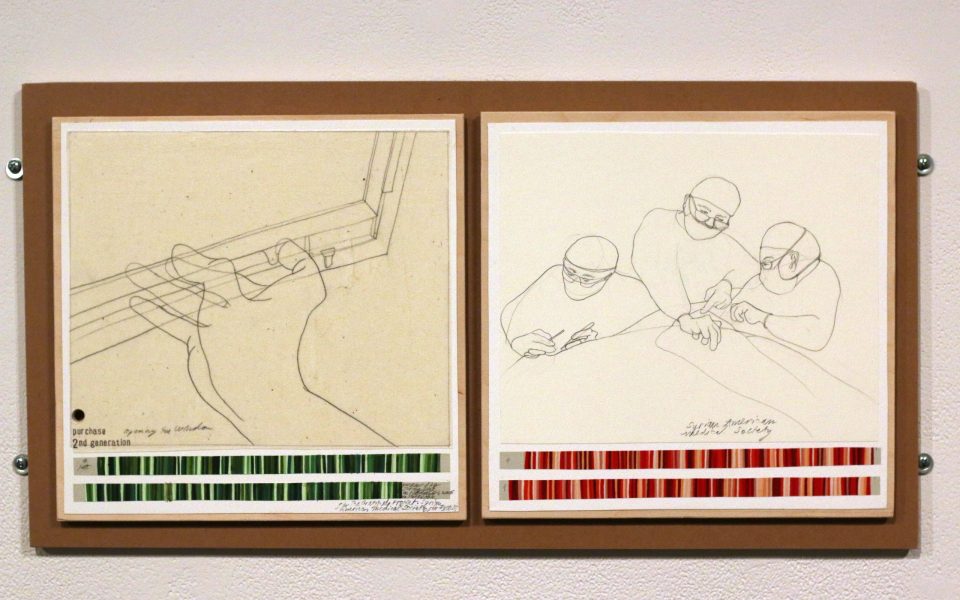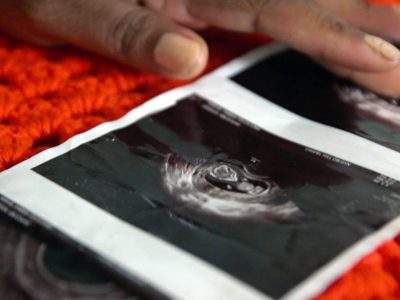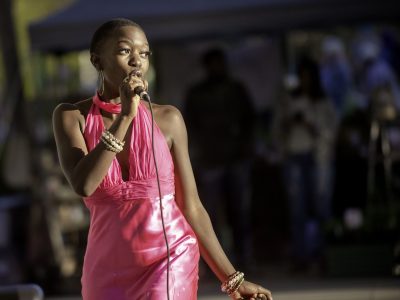Contradiction doesn’t normally appear in exhibit literature, much less represent an artist’s shifting perspective and the elaborate, enriched work that follows. But such might be the case for the newest installation in the Falk Gallery of UNCG’s Weatherspoon Art Museum.
Entering the gallery, visitors first encounter the “Income’s Outcome” selections of Danica Phelps’ Hoping to Help exhibit. These line drawings display ordinary moments of Phelps’ life — opening a letter, sitting at a desk chair, flipping through the pages of a book — and are themselves tracings of the originals that have already been sold.
Below each drawing, painted atop strips of recycled US currency, the artist represented each dollar that the piece earned with a small green line, and the dollars she then spent with red ones. Though not terribly engaging from piece to piece, it’s an interesting lens through which to consider art as a living. By arranging those ordinary moments with the coming and going of the each drawing’s financial success, Phelps hopes to “celebrate the mundane aspects of life that we all share.”
But, as the artist admits, not everyone shares the same mundanity after all.
The literature for Hoping to Help includes the artist’s changing perspective, one that has led to a series titled “The Gratitude Project” that completes the rest of the exhibit. In the literature, Phelps explains, “Increasingly my thoughts turn to those people who do not experience anything mundane. Listening to the news reminds me that for many people each day is a nightmare of hardships and uncertainty. I am haunted by their stories and confused by the fact that I get to live my comfortable life in this particular spot on the planet by relative chance while others, by the same random assignment of location or circumstance, suffer so terribly.”
So often known for their pursuit of truth and their confrontation of established social understanding, it’s surprising to hear these words from a successful artist. People shouldn’t need the country’s recent political turmoil to be aware of the nightmarish lives of members of any community. Nor should anyone be confused by their privilege or oblivious to fouler things than relative chance and random assignment that are to blame for terrible suffering.
Yet to Phelps’ credit, her shifting perspective and goals have led to the more powerful portion of the exhibit.
[pullquote]Danica Phelps’ Hoping to Help exhibit runs through April 9. For more info visit weatherspoon.uncg.edu.[/pullquote]
“The Gratitude Project” stems from an auction Phelps created to donate money from each sale to a nonprofit organization. Once a piece had been sold, Phelps combined a tracing of it with a drawing that illustrates the work of that nonprofit.
Still adorned with the painted green and red lines of monetary transactions, her own ordinary occasions have their charitable matches. Scratched in pencil on each piece are the descriptions of each moment and the names of the nonprofits. Examples include “Opening the window” with the Syrian American Medical Society, “Trying to figure out my finances” with Planned Parenthood, and “Coffee” with Doctors without Borders.
The pairs themselves seem like strange, even awkward bedfellows, as do the flimsy series titles, and another piece of the exhibit literature, a Facebook post that includes, “I have never had enough money to make a difference in the lives of people who are suffering, but I can make drawings!” The first clause of that quote almost suggests a narrow understanding of influence, whether it be limited to financial ability or not directly against the systems that determine financial inequality in the first place.
But many of the pieces are alluring, and all seem sincere. The auction raised more than $10,000 in its first two months. Despite the literature’s contradiction and frustrating quotes, Phelps’ honesty is still useful in a time when criticism strives to conquer influence.
Join the First Amendment Society, a membership that goes directly to funding TCB‘s newsroom.
We believe that reporting can save the world.
The TCB First Amendment Society recognizes the vital role of a free, unfettered press with a bundling of local experiences designed to build community, and unique engagements with our newsroom that will help you understand, and shape, local journalism’s critical role in uplifting the people in our cities.
All revenue goes directly into the newsroom as reporters’ salaries and freelance commissions.





Leave a Reply